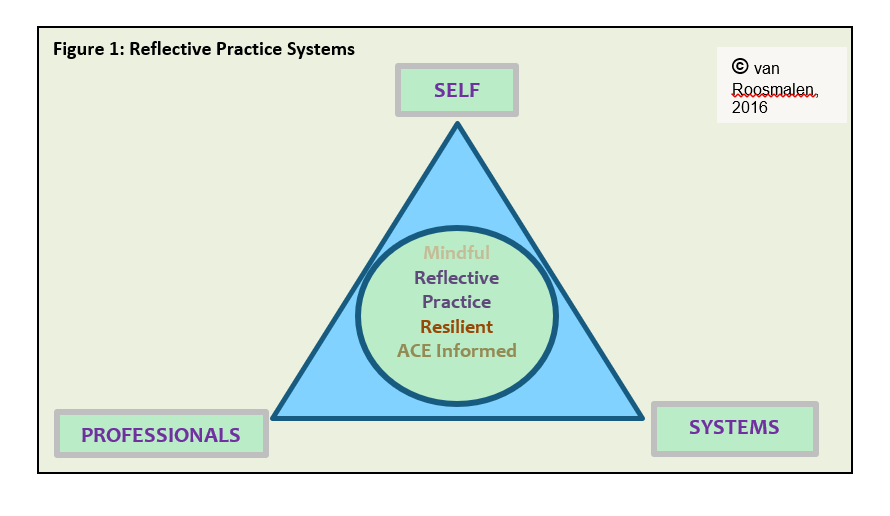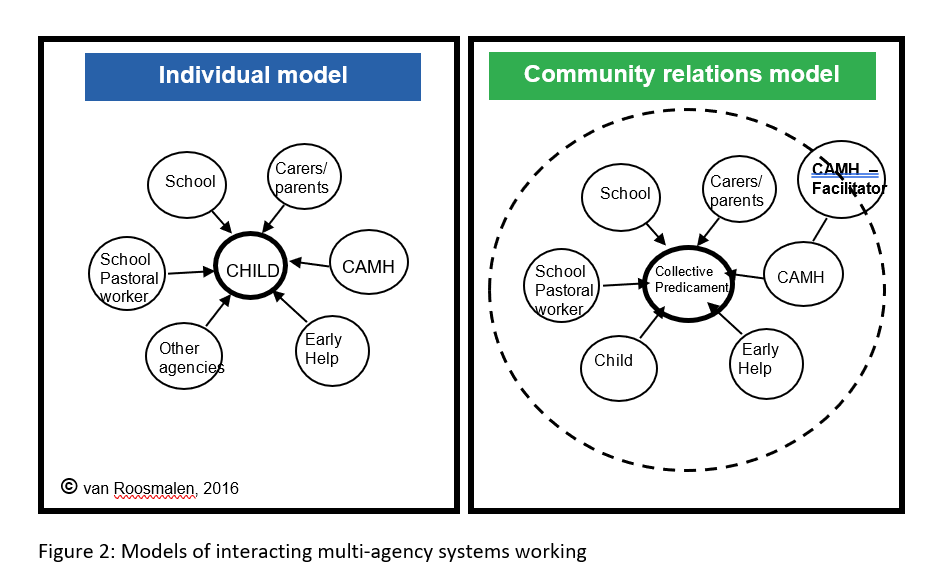Luton Early Help services are developing a whole family approach to support children, young people and their families. Two areas of development have been:
- To support the whole family’s mental health and wellbeing. An adult and a child mental health practitioner are located within the early help team supporting the emotional wellbeing of the whole family
- To enhance its resilience and partnership-based approach with families for their Teams around the Family (TAF). This approach develops professionals’ understanding of how adverse life events impact on families’ wellbeing, including their children, on their everyday functioning and inclusion, and how networks of professionals can work more effectively together
Resilient, reflective and effective practice - the Community Relations Model
The resilience approach, or specifically the Community Relations Model, identifies three dimensions to resilient and reflective practice (see Figure 1).
Initial audit and evaluation findings are very positive, with greater and earlier access to child and adult mental health support for families, in the community and integrated within early help services, and positive clinical outcomes for the families.
Healthy and resilient self and family relationships
The first dimension is the healthy and resilient self of the children, young people and families that we work with, and healthy family relationships. This includes how health and wellbeing for children develops within their family and extra-familial systems, how adverse experiences or events impact on their development, and their families’ wellbeing and functioning.
A definition of emotional wellbeing and mental health takes centre stage that is inherently relational, rather than an individual construct.
Healthy and resilient professional
The second dimension is developing and maintaining the healthy and resilient professional, who is reflective and responsive. This constitutes not only being mindful towards themselves, but also ‘the other’ (this includes a child, young person, a family and significant others, as well as fellow professionals), and the responsibility for being a mindful professional in relation to others (clients or other professionals).
Healthy and resilient system
The third dimension constitutes a resilient, healthy and mindful (multi-agency) system for Teams Around the Family, with healthy relationships between professionals and agencies (healthy systems supporting healthy practice), and between professionals and the family.

The third dimension requires a framework for practice and interaction for networked and multi-agency systems. We are looking critically at how our multi-agency systems work with each other and with families.
We want to move from a system of locating the problems ‘in’ children and families and moving from one agency to another, to working with families as part of (family, community and professional) systems who take collective and coordinated responsibility for issues and challenges that arise for children and their families. The family is an integral partner of, and active agent in, this process rather than being ‘done to’.
We contextualise the problems that children and families experience; understand the impact adverse life experiences have on families (including on their children’s emotional wellbeing and mental health), trans-generationally at times; use the resources and strengths available; and increase resilience in the family systems.
Next Steps
We are commencing with further development of this TAF model to move from a ‘deficit’ to a ‘resilience’ and resource based model. This includes how ‘problems’ can be reformulated as ‘collective (or contextualised and understandable) predicaments’. This is depicted by Figure 2, which makes a conceptual distinction of how multi-agency systems can work together.
The first model is a deficit and individualised model, where the change needs to occur ‘in’ one individual, party or a family. This type of system, which could be construed as a ‘blame’ system, can become disabling for families, and for professionals trying to help.
With the second model an issue is collectively understood and contextually formulated with the family as active partners, and then the TAF ‘system’ co-constructs a plan which can be worked through and reviewed regularly, in a collaborative way.
A call for interest from colleagues:
Work is ongoing in developing and clarifying the model, and supporting staff and systems to implement this model in practice. As we develop our early help transformation programme, this approach will be central to our delivery model.
We would like to hear from colleagues who practice in Early Help, and academic colleagues researching this area, to please be in touch (marc.vanroosmalen@nhs.net) in order to strengthen all our learning experiences and collaborate on how we can work most effectively with families to support their wellbeing.
Dr Marc van Roosmalen
Consultant Clinical Psychologist
Joint Psychological Therapies Lead, Luton CAMHS
East London Foundation Trust
Charter House, Alma Street
Luton, Beds, LU1 2PJ
marc.vanroosmalen@nhs.net
